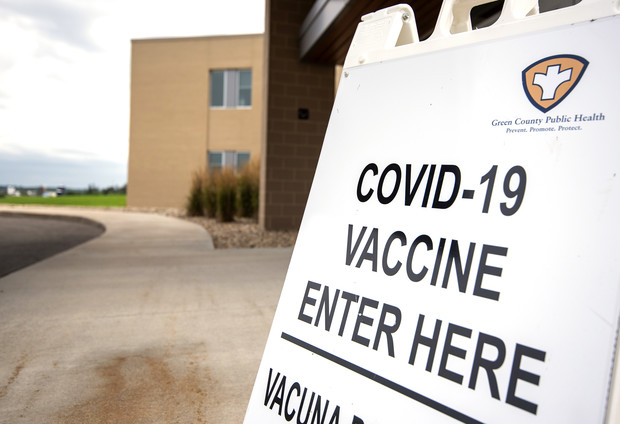Rural Hospitals Lose Few Workers Due to Vaccine Mandates
Loss of 20% expected, but actual figure about 2%, survey of state hospitals finds.

A sign at the Green County Health Department shows residents where to receive a COVID-19 vaccination Thursday, Aug. 12, 2021, in Monroe, Wis. Angela Major/WPR
Rural hospitals in Wisconsin that haven’t yet required employees to be vaccinated against COVID-19 say they expect mandates will cause many workers to quit — but those with requirements say they’ve seen very little attrition.
That’s one finding of a survey of dozens of rural hospitals in Wisconsin published this month by the Wisconsin Office of Rural Health.
A key finding: Hospitals that had not required workers to get vaccinated estimated they would lose more than 20 percent of their staff if they did so. But those with a COVID-19 vaccine requirement reported between 0 and 4 percent of staff had actually resigned as a result of them. The median figure was 2 percent, and included non-health care staff such as cafeteria or janitorial staff as well as health providers.
The data suggest that those that hadn’t implemented a mandate were overestimating the effect it would have on their workforce. But Office of Rural Health director John Eich said it’s also possible hospitals with the most vaccine-hesitant workforces were also last to implement mandates.
“It almost strikes me as a chicken-and-egg conundrum,” Eich said. “Is it that they haven’t done it yet, so they don’t realize it won’t be as bad as they think it will? Or is the reason they haven’t done it because they’ve taken the temperature, and it looks bad?”
Many health systems announced vaccine requirements for employees during the summer. In November, the Biden administration announced a new mandate requiring all hospitals that receive federal Medicare and Medicaid funding to require employees be vaccinated. That amounted to a blanket requirement for hospitals, and immediately became the subject of legal battles. Last week, a judge temporarily blocked the rule from going into effect.
“It’s going to hurt, even if it’s only 1 percent,” Eich said. “We’re grateful that it’s only 1, 2, 3 percent. But at the same time, even that will have an impact on an already pretty fragile system.”
Still, the divergent perceptions of the size of the mandate effect is demonstrated in two anonymous responses published with the survey.
“If our facility mandates the COVID vaccine we will be severely depleted … as (staff) would all resign and therefore we wouldn’t be able to stay open,” wrote one respondent.
Another, from a rural institution that had required vaccines, wrote the effect had been “less than anticipated.”
Some respondents also noted that their organizations offered medical and religious exemptions.
Aspirus, the Wausau-based health system that extends through the Northwoods and Upper Peninsula of Michigan, did not require employees to be vaccinated until the November federal requirement was announced. At that time, CEO Matthew Heywood said in a statement that “we accept Medicare and Medicaid funds, so we must comply. It’s also the right thing to do for our patients.” Aspirus has not announced the reversal of that policy as the federal mandate is tied up in court.
“As a public health person, I believe mandates work,” Eich said. “But I think it’s a really hard sell in independent-minded areas like small towns and rural (areas).”
In August, some health workers protested across Wisconsin over hospital systems’ vaccine requirements. They were met with support from Senate Majority Leader Chris Kapenga, R-Delafield, who wrote in a statement that he encouraged the protests and that “it will be impossible for the hospital system to function” without the workers involved in the protests. But the protests died down quickly, and there haven’t been any instances of Wisconsin hospital systems shutting down or reversing their policies.
According to the latest data from the state Department of Health Services, Wisconsin’s seven-day average for new COVID-19 infections is at more than 3,000 per day. The state is averaging 20 deaths from COVID per day; about 9,300 Wisconsinites have died from the disease since the beginning of the pandemic. According to the latest data, fully vaccinated people were nearly 11 times less likely to be hospitalized with the disease, and more than 15 times less likely to die than those who are unvaccinated.
Listen to the WPR report here.
Rural hospitals report losing 2 percent of workers over COVID-19 vaccine mandates was originally published by Wisconsin Public Radio.
More about the Coronavirus Pandemic
- Governors Tony Evers, JB Pritzker, Tim Walz, and Gretchen Whitmer Issue a Joint Statement Concerning Reports that Donald Trump Gave Russian Dictator Putin American COVID-19 Supplies - Gov. Tony Evers - Oct 11th, 2024
- MHD Release: Milwaukee Health Department Launches COVID-19 Wastewater Testing Dashboard - City of Milwaukee Health Department - Jan 23rd, 2024
- Milwaukee County Announces New Policies Related to COVID-19 Pandemic - County Executive David Crowley - May 9th, 2023
- DHS Details End of Emergency COVID-19 Response - Wisconsin Department of Health Services - Apr 26th, 2023
- Milwaukee Health Department Announces Upcoming Changes to COVID-19 Services - City of Milwaukee Health Department - Mar 17th, 2023
- Fitzgerald Applauds Passage of COVID-19 Origin Act - U.S. Rep. Scott Fitzgerald - Mar 10th, 2023
- DHS Expands Free COVID-19 Testing Program - Wisconsin Department of Health Services - Feb 10th, 2023
- MKE County: COVID-19 Hospitalizations Rising - Graham Kilmer - Jan 16th, 2023
- Not Enough Getting Bivalent Booster Shots, State Health Officials Warn - Gaby Vinick - Dec 26th, 2022
- Nearly All Wisconsinites Age 6 Months and Older Now Eligible for Updated COVID-19 Vaccine - Wisconsin Department of Health Services - Dec 15th, 2022
Read more about Coronavirus Pandemic here





















